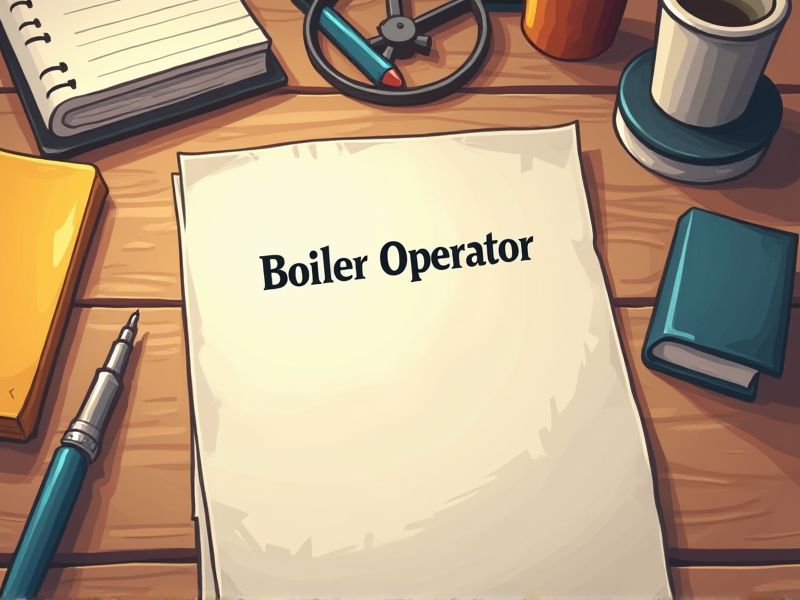
Boiler operators handle complex machinery vital for numerous industries; thus, their roles come with significant responsibility. Certifications ensure they possess the necessary skills and knowledge to safely and efficiently manage boiler systems, reducing risks of accidents or malfunctions. Regulatory bodies often mandate these certifications to maintain industry standards and compliance with safety regulations. Below are key certifications a boiler operator might require.
Boiler Operator Certification
Boiler operator certification ensures that operators have the necessary knowledge and skills to safely manage and maintain boiler systems. Proper certification reduces the risk of accidents and operational failures by ensuring operators understand critical safety protocols and regulatory compliance. Certified operators can identify potential issues early, preventing costly breakdowns and extending the lifespan of the equipment. Employers often require certification as it demonstrates a standard level of expertise and competence, providing peace of mind regarding operational safety and efficiency.
Pressure Vessel Inspection Certification
Pressure vessel inspection certification ensures that boiler operators are knowledgeable about safety standards, reducing the risk of accidents. Boilers operating under high pressure can pose significant hazards, necessitating trained individuals to detect potential failures before they occur. Certification provides operators with the skills to maintain optimal performance, thereby enhancing energy efficiency. Regulatory compliance mandates such certifications, which helps in preventing legal consequences for facility operators.
Boiler Safety Certification
Boiler Safety Certification is necessary for boiler operators to ensure they possess the required knowledge to handle equipment safely, reducing the risk of accidents and malfunctions. Certification provides operators with updated practices and guidelines, ensuring boilers run efficiently while meeting regulatory requirements. Without proper certification, operators may not be aware of specific protocols that prevent hazardous situations, potentially leading to severe operational disruptions. Regulatory compliance through certification also protects organizations from legal liabilities associated with untrained personnel managing high-risk equipment.
Advanced Boiler Operation Certification
Boilers operate under high pressure and temperature, requiring specialized knowledge and skills to ensure safe and efficient functioning; hence, the Advanced Boiler Operation Certification equips operators with critical expertise. Regulatory standards and safety protocols mandate certified professionals to minimize risks of accidents and system failures. Advanced training enhances the operator's capability to troubleshoot and maintain complex systems, reducing downtime and maintenance costs. Certification aligns with industry best practices, fostering trust and credibility among employers and clients.
Boiler Maintenance Technician Certification
Boiler maintenance technician certification is essential for a boiler operator to ensure adherence to safety standards and regulatory compliance. A certified technician can significantly reduce the risk of accidents and equipment failures through informed maintenance practices. Certification validates the operator's expertise, leading to increased job opportunities and potentially higher earnings. Employers often seek certified technicians to minimize operational risks and enhance the overall efficiency of boiler systems.
OSHA Safety Certification
OSHA Safety Certification ensures that boiler operators understand and comply with essential safety regulations, reducing the risk of workplace accidents. Certification provides operators with the knowledge to manage and handle boilers safely, preventing hazardous situations like explosions or leaks. Employers often require this certification to adhere to federal safety standards, minimizing legal liabilities and potential fines. Certified operators are more likely to identify potential hazards, leading to a safer work environment and increased operational efficiency.
Lockout/Tagout (LOTO) Certification
Lockout/Tagout (LOTO) certification is necessary for boiler operators to ensure safety and compliance with OSHA regulations, which aim to prevent accidental machine startups during maintenance. Without proper LOTO procedures, boiler operators risk exposure to hazardous energy, potentially leading to severe injuries or fatalities. LOTO certification equips operators with the knowledge to safely disable and control hazardous energy sources, reducing the likelihood of workplace accidents. Implementation of LOTO procedures enhances operational efficiency by minimizing equipment downtime and fostering a safer work environment.
Hazardous Materials (HAZMAT) Certification
HAZMAT certification equips boiler operators with the necessary knowledge to safely handle and manage hazardous materials commonly used in boilers, reducing the risk of accidents. Boilers often involve chemicals and materials that, if mishandled, could lead to hazardous situations such as fires or chemical spills. Regulatory compliance requires that professionals operating machinery involving hazardous substances have proper certification to ensure safety standards are met. HAZMAT certification enhances the operator's ability to identify and respond to potential hazards, minimizing health and environmental risks.
Industrial Process Control Certification
Industrial Process Control Certification ensures that a boiler operator understands the complexities of modern control systems, improving safety in operations. Certification imparts knowledge on regulations and best practices, reducing the likelihood of accidents and operational inconsistencies. Trained operators can optimize boiler efficiency, leading to cost savings and minimized environmental impact. Having certified operators reassures stakeholders about the facility's commitment to compliance and sustainability.
CPR/First Aid Certification
Possessing CPR/First Aid certification enhances a boiler operator's ability to respond effectively to emergencies, such as steam burns or chemical exposures. Boilers often operate in environments with heavy machinery, increasing the potential for accidents where immediate medical assistance can be crucial. Workplace safety standards frequently require certification to ensure operators can manage incidents without delay. Having certified staff can reduce workplace liabilities and foster a safer working environment.
Summary
With certifications, you gain enhanced skills and knowledge in boiler operations, resulting in improved performance. This leads to increased efficiency and safety in workplace settings. Employers' trust in your abilities boosts, often translating to better job opportunities and higher salaries. Certification establishes a recognized standard of expertise, elevating your professional credibility.
